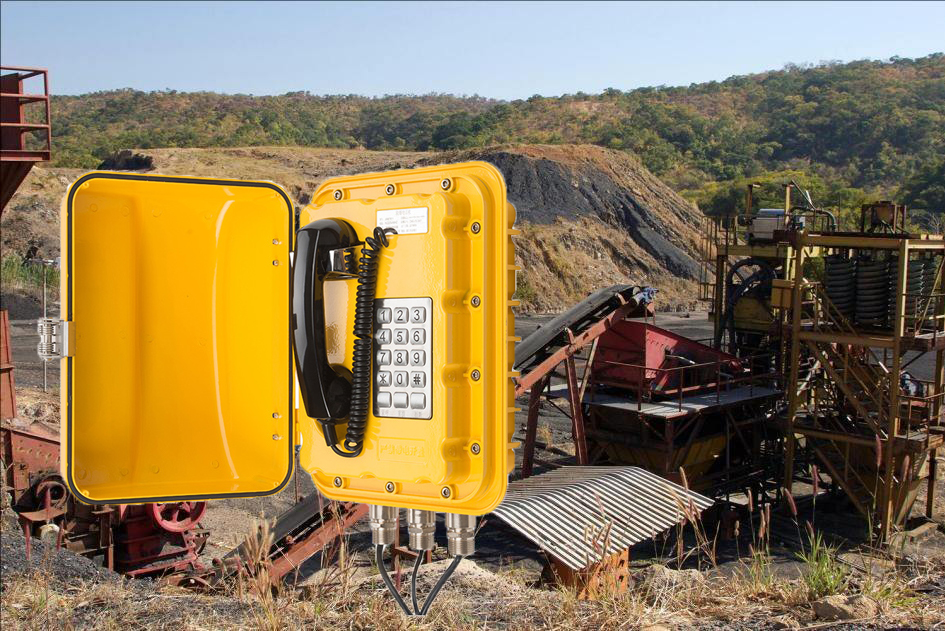Reliable communication forms the backbone of industrial operations. Harsh environments, however, often disrupt this critical function. Factors like water exposure, dust, and extreme temperatures lead to frequent equipment failures. For instance, a factory experiencing communication breakdowns reported an average of 80 minutes of lost production time per incident. A waterproof telephone, designed to withstand such conditions, ensures seamless communication and boosts productivity by up to 25%. Its durability and advanced features make it indispensable for industries facing operational challenges.

Key Takeaways
· Waterproof phones help communication work better in tough workplaces.
· These phones make things safer by allowing clear talks in emergencies. They help stop accidents and keep workers safe.
· Buying waterproof phones lowers costs by avoiding broken tools. They also help teams work together smoothly.
Overcoming Communication Challenges in Industrial Settings
Environmental factors like water, dust, and extreme temperatures
Industrial environments often expose communication tools to harsh conditions. Water, dust, and extreme temperatures frequently damage standard devices, leading to operational inefficiencies. For example, large factories, such as automotive plants spanning 1.5 million square feet, face unique challenges. Communication across such vast spaces becomes difficult, especially when environmental factors like noise and distance interfere. Constant noise from machinery complicates the transmission of quality updates and safety alerts. These disruptions hinder coordination between production lines, quality teams, and safety personnel, ultimately affecting overall efficiency.
A waterproof telephone addresses these challenges by offering robust protection against environmental hazards. Its durable design ensures uninterrupted communication, even in the most demanding conditions. This reliability makes it an essential tool for maintaining seamless operations in industrial settings.
Safety risks due to unreliable communication tools
Unreliable communication tools pose significant safety risks in industrial environments. Delayed or missed messages during emergencies can lead to accidents or injuries. For instance, when a safety alert fails to reach the intended team due to equipment failure, the response time increases, putting workers at risk. Dependable communication systems are critical for ensuring the safety of employees and minimizing hazards.
Waterproof telephones enhance safety by providing consistent and reliable communication. Their advanced features, such as noise cancellation, ensure clear messages even in noisy environments. These devices play a vital role in emergency preparedness, enabling swift responses and reducing potential risks.
Productivity losses caused by communication breakdowns
Communication breakdowns directly impact productivity in industrial operations. Factories report an average loss of 80 minutes of production time per incident, along with over 2.5 hours of support time lost. These disruptions not only delay workflows but also increase operational costs.
By integrating waterproof telephones into their communication systems, industries can significantly reduce downtime. These devices ensure uninterrupted communication, allowing teams to coordinate effectively and maintain productivity. Their reliability minimizes delays, helping industries achieve operational efficiency and meet production targets.
Advantages of Waterproof Telephone Systems
Durability and resistance to harsh conditions
Industrial environments demand communication tools that can endure extreme conditions. Waterproof telephones excel in this regard, offering unmatched durability. These devices are crafted from robust materials like aluminum alloy and carbon steel, ensuring long-lasting performance. Their resistance to water, dust, and temperature variations makes them ideal for challenging settings.
The durability of waterproof telephones is further validated by their IP ratings, which measure protection against environmental factors. The table below highlights the performance metrics:
|
IP Rating |
Protection Level Against Dust |
Protection Level Against Water |
|
IP54 |
Limited dust ingress |
Protected against water spray |
|
IP65 |
Complete dust ingress |
Protected against water jets |
|
IP66 |
Complete dust ingress |
Protected against powerful water jets |
|
IP67 |
Complete dust ingress |
Protected against temporary immersion in water |
|
IP68 |
Complete dust ingress |
Protected against continuous immersion in water |
These ratings demonstrate the ability of waterproof telephones to function reliably, even in the harshest conditions.
Enhanced safety through dependable emergency communication
Safety is paramount in industrial operations. Waterproof telephones enhance safety by providing consistent communication during emergencies. Their advanced features, such as noise cancellation, ensure clear audio transmission in noisy environments. Workers can quickly relay critical information, reducing response times and preventing accidents.
For example, in a mining site prone to flooding, a waterproof telephone enabled swift evacuation by maintaining communication despite water exposure. This reliability underscores their importance in safeguarding workers and minimizing risks.
Rugged designs for specific industrial applications
Waterproof telephones are designed to endure extreme industrial conditions. Their rugged construction ensures reliable performance in environments with high temperatures, moisture, dust, and physical impacts. Durability testing validates their ability to operate under heavy loads and continuous use, making them suitable for challenging applications like mining, construction, and offshore platforms.
· Key durability features include:
o Resistance to physical impacts and harsh weather conditions.
o Structural waterproofing to isolate liquids and moisture effectively.
o Process waterproofing using advanced materials like glue and sealing strips.
These features ensure uninterrupted communication, even in the most demanding settings, safeguarding productivity and operational efficiency.
FAQ
What makes a waterproof telephone suitable for industrial environments?
Its durable construction, using materials like aluminum alloy and carbon steel, ensures resistance to water, dust, and extreme temperatures, making it ideal for harsh industrial conditions.
Can waterproof telephones integrate with modern technologies?
Yes, they support IoT and smart systems, enabling remote monitoring, control, and enhanced communication across industrial sites, improving safety and operational efficiency.
Are waterproof telephones cost-effective for industries?
Their durability and reliability reduce downtime and maintenance costs, making them a long-term, cost-effective solution for industrial communication challenges.

